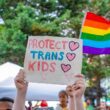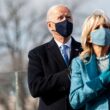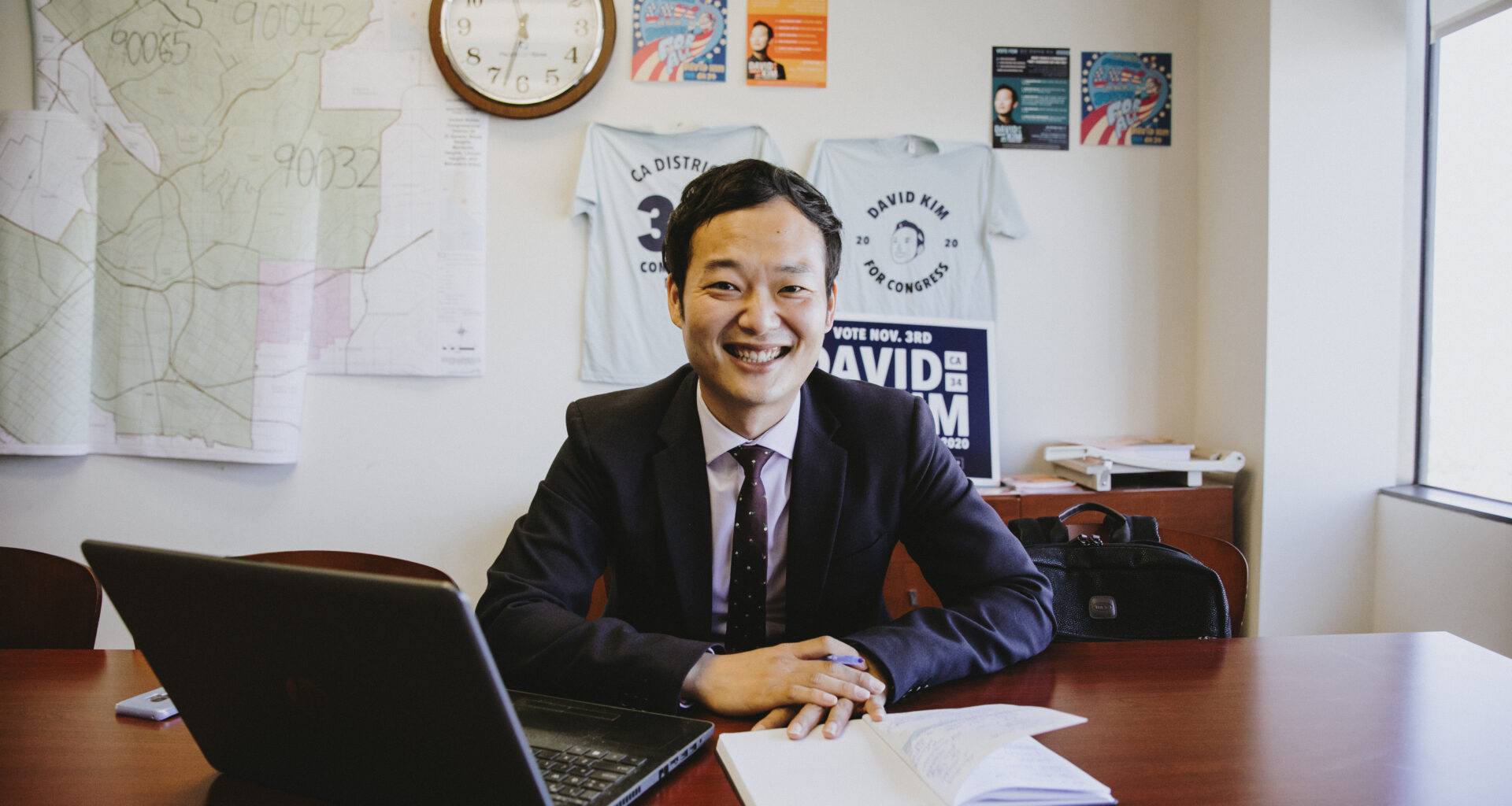Welcome to the second installment of The Yappie’s new series featuring Asian American Pacific Islander (AAPI) newsmakers, rising candidates, and lawmakers. If you’re interested in being featured, please email [email protected].
David Kim sits before three dishes packed with fresh pasta and glances at the screen, a wide grin on his face. In typical YouTuber fashion, he grabs a forkful and holds it close to the camera before taking a bite.
“Oh my gosh, this is really good,” he exclaims. “I didn’t know you could do pasta like this.”
Kim is hosting a mukbang, a type of virtual “eating show” popularized in South Korea. But instead of messily indulging in eye-popping amounts of food, he’s turned the broadcast into a conversation featuring restaurant owners from Los Angeles’ Koreatown.
For more than a year, Kim has been running as a Democrat in California’s 34th congressional district, an area that encompasses many of Los Angeles’ cultural enclaves like Chinatown, Little Bangladesh, Historic Filipinotown, and Little Tokyo. After the campaign experimented with its first mukbang six months ago, they’ve become a regular part of his schedule and a unique way to reach potential voters during the coronavirus pandemic.
At least a dozen mukbangs have been streamed to support local businesses, with owners often describing their struggles to access federal aid. Their concerns are familiar to Kim because they underscore the key motivation for his candidacy: the belief that Washington has failed to meet the moment.
A lifelong advocate
Kim is not your typical political candidate, and that’s the point. The 36-year-old immigration attorney (who once made a cameo on the ABC medical drama Grey’s Anatomy) is hoping California voters will resonate deeply with his life story of struggling in today’s America and gravitate toward his progressive values.
David Yung Ho Kim was born in Sierra Vista, Arizona in April 1984. His parents were Korean immigrant pastors, and the family relocated along the West Coast—first to Tacoma, Washington, where Kim spent most of his childhood; then to San Jose, California, where they eventually settled.
Kim said he learned about the importance of community service at a young age. When he was just eight years old, the Korean members of his parents’ church congregation were already relying on him to be a translator and advocate.
“I remember calling and negotiating phone bills for church members that couldn't speak English, going to different church members’ parent-teacher conferences for their kids, and talking on their behalf as an eight year old myself,” Kim told The Yappie. “I’ve always been in this serving position because my parents are pastors and I've just seen them serve people all their life. I think … that was something that I've just been trained and geared to do.”
After attending University of California, Berkeley (during which he briefly served as an intern with former Democratic Rep. Mike Honda) and graduating from the Benjamin N. Cardozo School of Law in New York, Kim moved to Los Angeles. He landed a job at the public integrity division of the Los Angeles County District Attorney’s office, which specializes in prosecuting corrupt politicians. But things got tough—and fast.
After leaving his gig at the district attorney’s office, Kim was suddenly thrown into financial uncertainty due to the scarcity of paid legal work. Wanting to keep his legal resume fresh while facing mounting student loan debt, he had no choice but to “grind and hustle.” He worked as an attorney for free during the day, then drove for Lyft and Uber from 6 p.m. until 3-4 a.m.
As he struggled to make ends meet, Kim soon noticed that many of his friends in the entertainment industry were also looking for help.
“They were like, ‘Hey David, can you look over my contract? Can you look over my deal memo?’” And I would do it,” he recalled. “I would ask them, ‘Why are you asking me to do this? Why aren't you asking your attorney?’ They would say, ‘Oh, yeah. I don't want to get charged $100 for a five-minute call. So I'm just calling you instead.’”
Those conversations inspired Kim to launch his own firm in 2014 called The Hollywood Lawyer, which offered legal services for cash-strapped creatives, including K-pop artists who couldn’t afford expensive attorneys. (During his high school years, Kim auditioned for a K-pop band in South Korea, and later worked for the widely-known JYP label’s U.S. arm). After juggling side gigs, unpaid work, and dabbling as an actor himself, this was his big break.
“There are a lot of working-class creatives getting ripped off in the industry, even by just attorneys. These attorneys are charging $10,000-20,000 retainer or hourly fees, plus percentages on top of that,” Kim said. “So I created a legal service for creatives who couldn’t afford these traditional law firms. I definitely represented a lot of Asian Americans.”
Kim sold the firm in April 2019 to take up a stint at Sony Pictures Entertainment—his dream job—but quickly left after realizing that the corporate world wasn’t a good fit. So earlier this year, he returned to his roots and took up his current position as a legal advocate for immigrants seeking asylum.
Nevertheless, he felt the urge to do more. Kim replaced the weeknights and weekends he previously spent as a rideshare driver with countless hours in community organizing. In 2019, he became an elected official on a local neighborhood council. But after volunteering for a Filipino American Green Party candidate named Kenneth Mejia, Kim looked around and realized so much more needed to be done.
So he set his sights on Capitol Hill.
Meeting the moment
Kim launched his volunteer-driven congressional campaign in July 2019, following in the footsteps of two other political newcomers—former Democratic presidential candidates Marianne Williamson and Andrew Yang. He fused their platforms to create something of his own: a political vision based on "financial freedom, love, and justice" that he called “A Floor to Stand On.”
Embedded in Kim’s plan is a litany of dream policies touted by progressive activists, including support for Medicare for All, a Green New Deal, a Homes Guarantee, campaign finance reform, and the abolishment of U.S. Immigration and Customs Enforcement. Kim told The Yappie that he would also push for legislation establishing term limits and mandating that members of Congress hold monthly town hall meetings. True to form, Kim was adamant that he would be no exception.
“I'm not going to be a career politician,” he said. “I'm just going in and out because I really feel like government should be representative, from people representing people from all different walks [and] backgrounds in life.”
Most notably, Kim is part of a new crop of grassroots candidates championing Yang’s signature campaign proposal: a Universal Basic Income (UBI) of $1,000 a month.
“Our businesses thrive when we have purchasing power [and] our workers thrive when they have a financial safety net,” Kim said. “UBI would be able to provide that financial safety net, would be able to provide that purchasing power and create that trickle-up economy.”
After making the rounds on virtually every UBI-focused podcast and coming in second in the crowded March primary, Kim’s full-throated advocacy captured Yang’s attention. The entrepreneur, fresh off the launch of his nonprofit Humanity Forward, soon announced his intent to endorse Kim in May, calling him “a great role model for our community.” Kim told The Yappie that he was grateful for Yang’s support and that the endorsement opened doors for his campaign.
As the nation continues to grapple with its economic recession, Kim is going further than just talking about the potential benefits for direct cash relief. In September, his campaign unveiled Los Angeles’ first-ever UBI trial—partnering with tech company Steady to provide $840 per month for three months to 25 families impacted by the pandemic. Kim noted that he wanted to expand the trial beyond 25 families, but “the number was pretty much determined based on how much money we actually had.”
The recipients of the cash were supposed to provide documentation on how the money has benefited their lives, and Kim hopes results will send a loud and clear message to Congress, where negotiations over additional stimulus checks have stalled following initial $1,200 payments in March.
“The times are more urgent than they've ever been in our district,” he said. “We have per capita incomes less than the average rent of a one-bedroom apartment [in Los Angeles]. It just doesn't make sense that our elected officials act like everything's okay.”
Challenges ahead
According to the Los Angeles Times, CA-34 is one of the poorest and most immigrant-heavy districts in the state, making it particularly sensitive to policy disputes in Washington. The area’s majority Latino population has enjoyed Democratic Latino representation in Congress for decades, with its most high-profile advocate being Xavier Becerra, who vacated his seat in 2017 to become California attorney general.
The district is also home to the nation’s largest Korean American community, which is itching to send one of its own to Washington. In the 2017 special election to determine Becerra’s replacement in the U.S. House of Representatives, now-Congressman Jimmy Gomez faced a remarkably strong challenge from former Los Angeles City Planning Commissioner Robert Lee Ahn, setting up what the Associated Press described as “a test” of Latino and Korean influence.
Ahn came up short in his race against Gomez and failed to substantially expand his appeal beyond Koreatown. But three years later, Asian American voters have a fresh opportunity to send a Korean American to Congress. Whether they’re aware of this second chance will be a key factor in Kim’s race.
Kim also faces an uphill climb attributed to factors out of his control. In an election year where coverage surrounding the presidential race has been all-consuming, the district has received little national attention since it is guaranteed to stay in Democratic hands: the Golden State’s election system permits two Democrats to advance through the primaries and compete against each other in the general election.
Furthermore, identifying as a Democrat on the ballot doesn’t mean the state party itself has to stay neutral. Just like in 2017, Gomez has the support of the California Democratic Party, as well as endorsements from local AAPI organizations, labor groups, and Asian American members of Congress like Rep. Judy Chu. Kim, meanwhile, is backed by the Sunrise Movement, the Progressive Asian Network for Action, and the Los Angeles chapter of Sen. Bernie Sanders’ (D-Vermont) group Our Revolution—which caused a stir Friday after publicly demanding that the national organization retract its endorsement of Gomez.
The typical advantages afforded to incumbents like Gomez, along with their sky high reelection rates, has meant no reliable polling of the race—something that has left Kim’s tight-budgeted campaign guessing.




‘You’re not alone’
Regardless of the seemingly insurmountable odds, Kim’s candidacy is emblematic of the AAPI community’s emerging awareness of the need for representation in government.
Researchers at AAPI Data estimated that a record 32 AAPI candidates ran for Congress in November 2018, double the number from 2010, in part due to the rapid growth and consolidation of Asian Americans as a voting bloc. But Kim reiterated that there is more work to be done.
“On a national scale, if Asians represent almost 6% [of the population], then we should reflect that in our elected government as well,” he said. “To see somebody else that looks like you and [is] there for you … makes a huge difference, because that shows that now your community has presence.”
While Kim would be the first Korean American to represent Los Angeles’ Koreatown and the first Asian American to represent CA-34 in Congress, he would also join a small but growing group of gay AAPI public servants. According to a recent report by the LGBTQ Victory Institute, the number of openly LGBTQ+ AAPI officials in the U.S. stood at just 17 in June—with fellow Californian Rep. Mark Takano (D) among them.
When asked if he had a message for others in the community who might be interested in running for office, Kim replied: “For those who are still in the closet, I hear you. I feel you. You’re not alone. Don't ever be shy to stand up for who you are and what you stand for.”









